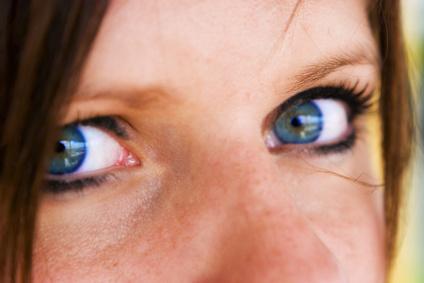Conjunctivitis, also called pink eye, is a common and treatable eye condition that causes your inner eyelid to become inflamed. If something you are allergic or sensitive to gets into your eyes, you may get allergic conjunctivitis. This type of conjunctivitis is not contagious as is pink eye, which develops from bacteria or viruses, according to WebMD.
Causes
You can get allergic conjunctivitis by having direct contact with a substance that is an allergen through the air or by touching your eyes if an allergen is on your hands. Typical allergens that can cause allergic conjunctivitis are pollen, fungus, spores, dust and pet dander. Wind, perfume, smoke and smog can irritate the condition, but they are not the cause of the problem, according to Penn State.
What Happens
If you expose your eyes to allergens frequently, your body starts to produce antibodies to fight the allergens. Meanwhile, your body is also producing the chemical histamine, which causes swelling, redness and itching.
Types
You need to determine if you have allergic conjunctivitis versus viral or bacterial conjunctivitis so that you can treat it, according to WebMD. One way to distinguish viral or bacterial pink eye from allergic pink eye is that allergic pink eye usually occurs in both eyes, whereas viral or bacterial pink eye usually affects only one eye. If you have allergic conjunctivitis, and you come into contact with pollen at the same time each year, for example, you will have watery, red, itchy and swelling eyes each year.
Treatment
If you have allergic conjunctivitis, see a doctor. She may recommend that you avoid allergens that you know trigger the condition. You can’t always avoid airborne triggers, such as pollen, so your doctor may treat this with oral antihistamines. The antihistamine acts against the histamines your body produces. Your doctor may also prescribe eye drops to relieve the symptoms. Ocular decongestants constrict blood vessels in the eye, but you can only use them for a few days.
If Treatment Doesn’t Work
If your allergic conjunctivitis does not respond to treatment, your doctor may recommend you see an allergist who can treat you using immunotherapy. This treatment injects tiny amounts of the allergen under your skin over several years. You gradually lose your sensitivity to allergens with this process.
Get Relief
Allergic conjunctivitis is uncomfortable. For some immediate relief, remove contact lenses, if you wear them. Use cold compresses on your eyes. You may also want to use non-medicated, eye lubricating drops. Other types of drops may irritate your eyes.
Photo Credit
- eyes image by Mat Hayward from Fotolia.com





